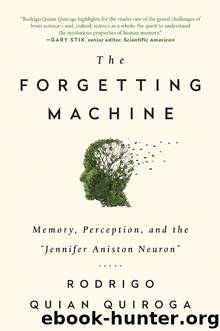The Forgetting Machine by Rodrigo Quian Quiroga

Author:Rodrigo Quian Quiroga
Language: eng
Format: mobi, epub
ISBN: 9781944648558
Publisher: BenBella Books, Inc.
Published: 0101-01-01T00:00:00+00:00
Richard Andersen, a professor at the California Institute of Technology (Caltech) and one of my mentors in neuroscience, said once that a lecture should convey at most one or two general messages. Richard does not study memory,14 but, as a gifted speaker, he has come to understand that attempting to communicate more than a couple of messages does little but confuse the audience and reduce the likelihood that anything will be remembered. Of course, during a one-hour talk, we must do more than simply recite our one or two messages (which would take seconds). The content of the talk must aim for its goal by developing those one or two ideas richly and memorably. The secret of good public speaking, in my opinion, lies in knowing well what these ideas are and communicating them in a way that ensures the audience will recall them a week, a month, or even a few years later. One may adorn the talk with vivid details—maybe some of these, if they strike a particular audience member as noteworthy, will be remembered in the future—but these details should reinforce the main ideas, not compete against them.
These are, of course, my personal opinions, not absolute truths. I am certainly not the first person to have such views; after all, it has become somewhat of a cliché to say that schools should teach pupils to think, not to memorize. Perhaps the greatest contribution neuroscience can make to this debate is the discovery that the human brain has a very limited ability to process and retain information. A teacher does his best to make it through the year’s curriculum because he wants his students to learn the subjects in full. What he may not know is that, no matter how hard they try, his students will not be able to remember much of what they learned a while later. If he teaches many topics, one after another, he will cover a wide program of study, but almost nothing will stay in the students’ memories for long. It may be much more effective to select a few subjects and flesh them out repeatedly, instead of jumping from topic to topic. Perhaps, as in a presentation, he can add details and related content, but he should always keep the core concepts he has decided to focus upon front and center, and come back to them time and time again, since these are what his students will remember.
As we saw in Chapter 4, Ebbinghaus showed in the late nineteenth century that repetition helps consolidate memory. However, the sort of repetition I refer to, going over and over the same topics, is very different from repetition as an aid to memory. In fact, I propose the exact opposite of requiring students to repeat the same facts from memory again and again. Instead, I argue that the same topics should be covered many times, but with different nuances, in different contexts, through different associations. It is precisely these contexts and associations that consolidate memories in a much sturdier and deeper way than that afforded by rote memorization.
Download
The Forgetting Machine by Rodrigo Quian Quiroga.epub
This site does not store any files on its server. We only index and link to content provided by other sites. Please contact the content providers to delete copyright contents if any and email us, we'll remove relevant links or contents immediately.
| Administration & Medicine Economics | Allied Health Professions |
| Basic Sciences | Dentistry |
| History | Medical Informatics |
| Medicine | Nursing |
| Pharmacology | Psychology |
| Research | Veterinary Medicine |
The Art of Thinking Clearly by Rolf Dobelli(10487)
The 5 Love Languages: The Secret to Love That Lasts by Gary Chapman(9809)
Mindhunter: Inside the FBI's Elite Serial Crime Unit by John E. Douglas & Mark Olshaker(9339)
Becoming Supernatural by Dr. Joe Dispenza(8215)
Nudge - Improving Decisions about Health, Wealth, and Happiness by Thaler Sunstein(7706)
The Road Less Traveled by M. Scott Peck(7601)
Mastermind: How to Think Like Sherlock Holmes by Maria Konnikova(7343)
Enlightenment Now: The Case for Reason, Science, Humanism, and Progress by Steven Pinker(7311)
Win Bigly by Scott Adams(7195)
The Way of Zen by Alan W. Watts(6614)
Factfulness: Ten Reasons We're Wrong About the World – and Why Things Are Better Than You Think by Hans Rosling(4742)
The State of Affairs by Esther Perel(4719)
Gerald's Game by Stephen King(4654)
Man's Search for Meaning by Viktor Frankl(4605)
The Confidence Code by Katty Kay(4260)
Thinking in Bets by Annie Duke(4226)
The Healing Self by Deepak Chopra(3578)
Hidden Persuasion: 33 psychological influence techniques in advertising by Marc Andrews & Matthijs van Leeuwen & Rick van Baaren(3565)
The Worm at the Core by Sheldon Solomon(3487)
